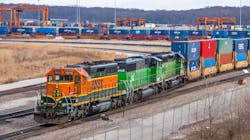One of the U.S. rail industry's largest unions voted against a tentative agreement with employers on Nov. 21, heightening the possibility of a freight rail strike as early as Dec. 5. The strike could cripple shipping during the busy holiday period, with demand spilling over into an under-equipped trucking industry.
SMART-TD voted against the tentative agreement Sunday night. The BLET, another one of rail’s largest unions, voted to ratify the deal but said it would join SMART-TD to honor the strike. The two unions are the rail industry’s largest, representing half the unionized workers on major freight railways.
“We stood shoulder to shoulder with our brothers and sisters in SMART-TD and others in rail labor throughout this process, and we will continue to stand in solidarity with them as we approach the finish line in this round of negotiations,” said BLET President Dennis Pierce.
If the freight volumes carried by the rail industry were to shift to the trucking market, there would not be enough capacity, according to American Trucking Associations.
“Idling all 7,000 long-distance daily freight trains in the U.S. would require more than 460,000 additional long-haul trucks every day, which is not possible based on equipment availability and an existing shortage of 80,000 drivers,” Chris Spear, ATA president and CEO, wrote in a Sept. 9 letter sent to Capitol Hill. “As such, any rail service disruption will create havoc in the supply chain and fuel inflationary pressures across the board.”
See also: Freight rail union rejects labor deal, reigniting possibility of strike
The BMWED, which represents Brotherhood of Maintenance of Way Employes, is scheduled to strike on Dec. 5 with The Brotherhood of Railroad Signalmen (BRS) but said it would extend its status quo period to Dec. 9 to sync with SMART-TD’s and BLET’s, possibly striking that same day.
“SMART-TD members, with their votes, have spoken, it’s now back to the bargaining table for our operating craft members,” said SMART-TD president Jeremy Ferguson. “This can all be settled through negotiations and without a strike. A settlement would be in the best interests of the workers, the railroads, shippers, and the American people.”
BMWED and BRS will talk again with the National Carriers Conference Committee, which represents railroad management, on Nov. 21 about pay for sick leave, one of the key issues in negotiations.
BLET voted 53.5% in favor and 46.5% against the agreement. Among SMART-TD members, 62.48% of yardmasters voted for the agreement, but another group, train and engine service members, voted against it with 50.87%.
About the Author
Scott Keith
Scott Keith is a former fleet owner digital editor, who was on staff from 2022 to 2023.

